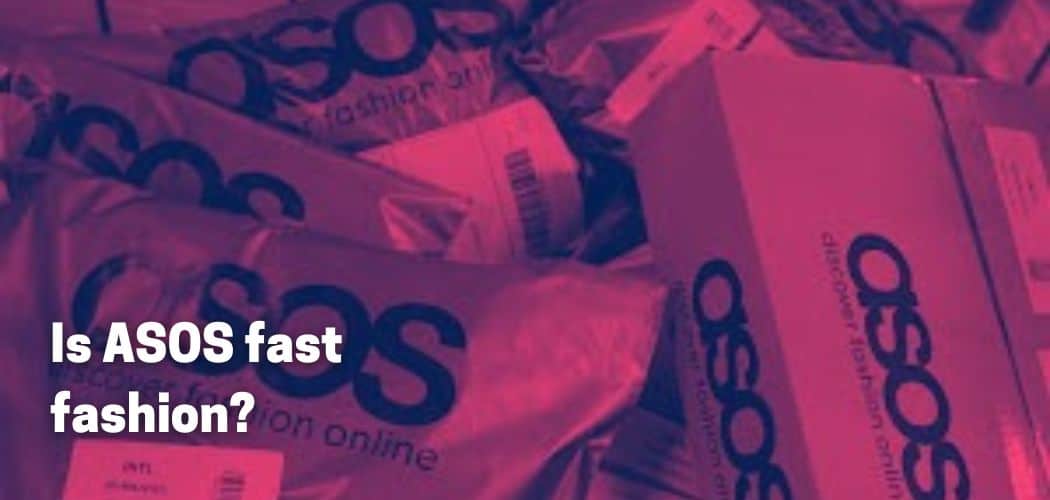If looking trendy is your goal, you must be aware of all the top-notch brands, right?
Some of the most valuable brands in the world are Hermes, Gucci and Loius Vuitton.
However, it doesn’t mean you have to spend top dollars to stay in fashion. ASOS hosts several brands under its belt, so you get affordable fashion within your reach.
Let’s learn more about ASOS which has grappled the fashion industry with its new trends for every season.
Is ASOS classed as fast fashion?
But first, we must know what exactly is fast fashion?
Fast fashion is cheap but trendy clothing. It is mostly a replica of ideas from the catwalk or celebrity culture. So, you get high-street fashion at a fraction of the original price.

Something you could only dream of wearing earlier is now within your reach, and that too within days of the trend starting.
So, yes. By this definition, ASOS is a fast-fashion brand. It offers thousands of stylish designs at unbelievable low prices.
Is shopping at ASOS ethical?
You must be wondering: So, even if ASOS is fast-fashion, what is the big deal. After all, isn’t this what fashion is all about? Flaunting new trends as they make waves through the fashion industry?
The problem is that fast fashion puts a huge burden on the environment. The premise behind fast fashion is to get new trends on the rack, which shoppers use and discard quickly.
If you want to stay relevant, shop for the latest fashion, use it and get rid of it after a few wears. This starts a cycle of overproduction and pollution.
So, essentially, ASOS plays a part in overconsumption making it one of the world’s largest polluters.
While earlier, shopping used to be an occasional affair, done in months or even yearly, fast fashion led to the trend of shopping much more frequently. Now shopping is done not out of necessity but as a hobby.
Is shopping at ASOS ethical?
For that, we’ll need to consider a few factors.
Environmental effect
The company has made a commitment to zero emissions by the year 2030. However, there is no evidence of achieving this target.
ASOS brand claims to use sustainable materials in its clothing. But again, there is no evidence of minimizing textile waste when manufacturing the product.
Moreover, there is no evidence of ASOS implementing water reduction measures in its daily operations.
In 2010, ASOS introduced a collection ‘Responsible Edit’, consisting of beauty, accessories and clothing products marketed as having a lower environmental impact. This was not a good sign.

As it indicated that while the company is responding to the growing demand for sustainable fashion, it accounts only for a small percentage of the total items manufactured at ASOS.
Also, sustainable fashion collections launched by huge retailers like ASOS, are often seen as greenwashing. This is a marketing tactic used by organizations to portray themselves as more sustainable, in front of the customers.
Overall, ASOS rates 2 out of 5 in the sustainability rating, given by the famous Good on You.
Animal welfare
Let’s give credit where it is due. ASOS does have a formal animal policy per Five Freedoms. It also does not use exotic animal skin, or hair and does not use angora, fur or down.

However, ASOS still has not specified where it sources its leather from.
Does ASOS use child labour?
In 2016, ASOS was caught in a fire when a BBC investigation revealed ASOS among other fashion giants employing child workers in their supply chains.
As per the BBC investigation, the children were exhausted after shifts 60-hour weeks and were unable to attend school.
Earlier, in 2011, ASOS also received the worst Ethical Consumer Rating for its supply chain management.
Is ASOS unethical?
However, since the child labour implication and the 2011 worst rating, ASOS has made many improvements.

It brought its Code of Conduct in line with the Ethical Trading Initiative’s Base Code. In 2018, ASOS published a full list of its suppliers when the fashion industry called for greater transparency.
The Fashion Transparency Index 2021 mentions that ASOS is one best practice example which updates its supplier list every two months.
This helps the stakeholders in better understating the supply chain and see if there are any labour, human rights or environmental risks involved.
So, while ASOS is still a fast-fashion brand, leading to the disposable fashion trend, it is striving to be more sustainable.
We cannot label ASOS as an unethical place as it has been working on transparency for a year now.
Sure, it needs to still go a long way.
ASOS mapped its carbon footprint and revealed that 91% of the emission comes from the transportation and delivery of goods. To combat this, ASOS has introduced electric vehicles in London’s low-emission zone.
Despite the recent measures taken by ASOS, it is still very much a fast-fashion brand and fast fashion can never be sustainable. It is a good thing though, that ASOS is trying to be a more responsible brand while catering to growing fashion demands.
